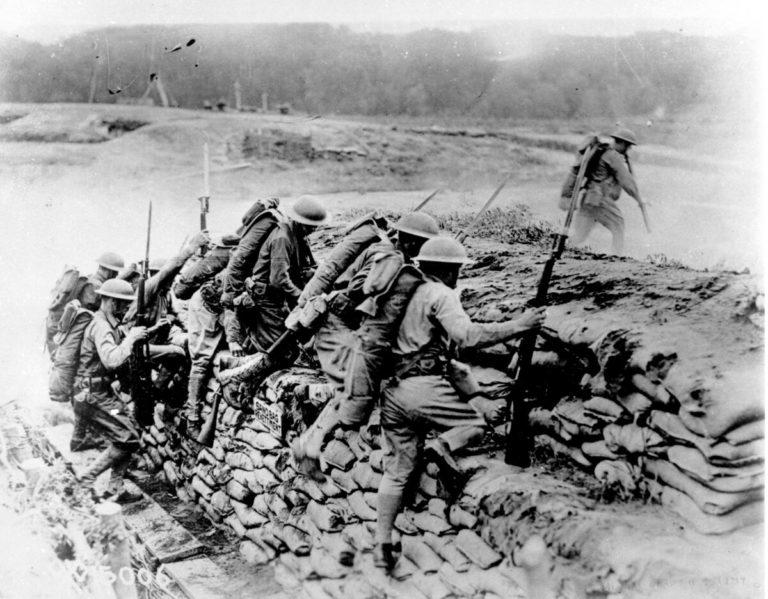Changing Attitudes On Veterans Day
Authored by Kelli Ballard via LibertyNation.com,
Throughout history, there have been conflicts and wars, and the attitude about the engagements – and its warriors – change depending on the public opinion at the time. Consider the medieval era where being a knight was romanticized. They were considered chivalrous with a code that expected them to be pure in both thought and deed. When the brave knights returned after a battle, they were honored and celebrated. Great feasts were given in their name and the ladies swooned and threw lace, ribbons, and other personal effects to show their support – and hopefully catch a legendary hero husband in the process.
World Wars I and II soldiers were treated with respect and given a place of honor. American citizens payed tribute to them for their sacrifices.
But now, let’s flash forward to the Vietnam War and the veterans who suffered not only from wartime injuries (both physical and mental), but also from hostility and disrespect from the very citizens they put their lives on the line to protect.
Ashamed To Be An American Soldier
Whether being drafted into service or signing up on their own, young men, boys, and women, did their duty and served their nation. They went into unfamiliar and hostile territory to fight against the enemy; some being injured or even losing their lives. They witnessed atrocities, saw their platoon brethren die, and dreamed of the day when they could return home, to their loved ones.
However, when that day came, instead of open, welcoming arms, many veterans were met with anger, people spitting on them, calling them “baby killers.” Far from being worshipped as heroes, as their former soldiers were, Vietnam veterans were harassed and made to feel ashamed for their patriotic service.
What had happened to American citizens that once revered the warriors who protected them? Why had they suddenly become so antagonistic against their own soldiers? Aside from the baby killers accusations, there could be several other reasons. For the first time, Americans were losing a war, and fear took hold. But as Bob Feist, an Army veteran and retired Navy pilot wrote in his opinion piece “Disrespect for Vietnam vets is fact, not fiction” for the Star Tribune:
“We need to remember that it was the South Vietnamese government that lost their war, not the much-maligned American soldier. American service members did not suffer defeat, even though most of us felt defeated. Policy and politics out of Washington had failed, not the military.”
Adding to that, the war had left the nation hurting financially and there just weren’t enough funds to help the injured veterans. War always has an emotional and psychological impact, and returning home to be insulted, spit on, and mistreated did not help matters. As Feist said, “Spitting stories, while true, aren’t the point. But denial of what we suffered dishonors us again.”
Peter Langenus commanded the Delta Company, 3rd Battalion/7th Infantry, 199th Light Infantry Brigade from 1969-70. Some of the missions he led his men on lasted for 30 days or more. He said:
“without shaving, bathing or changing clothing. None of that prepared me for the reception at home upon our return.”
Thankfully, the American people have once again changed their attitudes towards their defenders and the soldier is again celebrated for his or her services.
Honored And Revered: Today’s American Soldier
It took another 20 years after the Vietnam War for Americans to return to respecting their warriors. The first step in the healing process began in 1982 with the dedication of the Vietnam Veterans Memorial. After the Gulf War (1990-91), people began waving flags and celebrating soldiers. Langenus, who had suffered as a Vietnam veteran, and also a veteran of Desert Storm, couldn’t believe the change around.
“The Vietnam veterans, we couldn’t believe it. We could not understand getting letters from school kids. You couldn’t believe that people were cheering you.”
The biggest factor in the change in American attitudes towards veterans most definitely has to be after 9/11; a direct attack on American soil. Since then, citizens wear flag pins and go around saying “thank you for your service.” On Veterans Day, restaurants give military personnel free meals. Parades have returned to welcome home soldiers. The American soldier is no longer dishonored and is now revered.
Steven A. Wowwk is a disabled Vietnam Veteran who served in the Army’s First Cavalry Division. He is happy to see returning soldiers treated with respect, but:
“Deeds need to be done in addition to words. I appreciate the respect of ‘thank you’ because that was something I never received when I came home. It’s better than nothing. It’s better than them walking away and not even recognizing you. But what are you doing in addition to saying ‘thank you’?
Veterans Day started out as Armistice Day, to commemorate the end of World War I. In 1954, Dwight D. Eisenhower officially changed the name to Veterans Day to honor all veterans from all conflicts. This year, while remembering and honoring today’s heroes, let’s not forget those who fought and died for our country, and who were treated with such disrespect when returning to American soil.
Interesting Facts
-
2 million living veterans served during at least one war since 2018.
-
9% of veterans are women.
-
Seven million veterans served during the Vietnam War.
-
Three million veterans have served in support of the War on Terrorism.
-
Of the 16 million Americans who served during World War II, just under 500,000 were still alive as of 2018.
-
Two million veterans served during the Korean War.
-
As of 2017, Alaska, Maine, and Montana had the highest percentage of Veterans.
-
In 2018, Connecticut was home to the highest percentage of World War II veterans at 7.1%.
Tyler Durden
Mon, 11/11/2019 – 15:52
via ZeroHedge News https://ift.tt/2Q9uphc Tyler Durden
